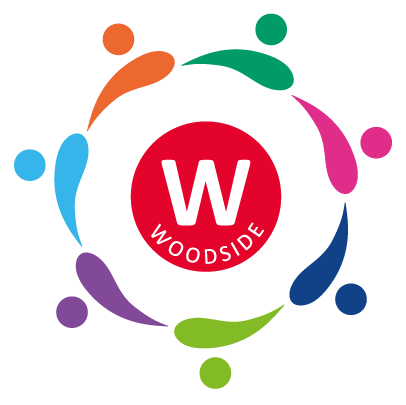English offer
The more that you read, the more things that you will know. The more that you learn the more places you’ll go – Dr Seuss
Intent
At Woodside Primary Academy, through the English curriculum, we help pupils develop the skills and knowledge that will enable them to communicate effectively and creatively through spoken and written language and equip them with the skills they need to become lifelong learners.
Our intent for our pupils is that they learn to speak and write fluently so that they can communicate their thoughts, ideas and emotions to others. Through reading in particular, our pupils have a chance to develop culturally, emotionally, intellectually, socially and spiritually, from the extensive range of literature and educational experiences we offer.
At Woodside we understand how important the skills of language and communication are in supporting pupils to participate fully as a member of society. Our English curriculum is ambitious and the Woodside focus on Steven Covey’s “Leader in Me (LIM) “, enhances the school’s Life Values and the focus on being an independent learner; it provides a platform for all pupils to share their voice by taking shared responsibilities, read and write confidently for a range of purposes, to enable them to effectively participate in wider society
Aims
Through our English curriculum, we promote high standards of language and literacy by equipping pupils with a strong command of the spoken and written language. Pupils are supported to develop their love of literature through widespread reading for enjoyment, as well as through our wider Enrichment experiences and rich text approach to writing. Our curriculum for English ensures that all pupils build up the knowledge and skills necessary to:
∙ Read easily, fluently and with good understanding
∙ Develop the habit of reading widely and often, for both pleasure and information
∙ Acquire a wide vocabulary, an understanding of grammar and knowledge of linguistic conventions for reading, writing and spoken language
∙ Appreciate our rich and varied literary heritage, which is enriched with diversity
∙ Write clearly, accurately and coherently, adapting their language and style in and for a range of contexts, purposes and audiences
∙ Use discussion to learn; they should be able to elaborate and explain clearly their understanding and ideas
∙ Are competent in the arts of speaking and listening, making formal presentations, demonstrating to others and participating in debate
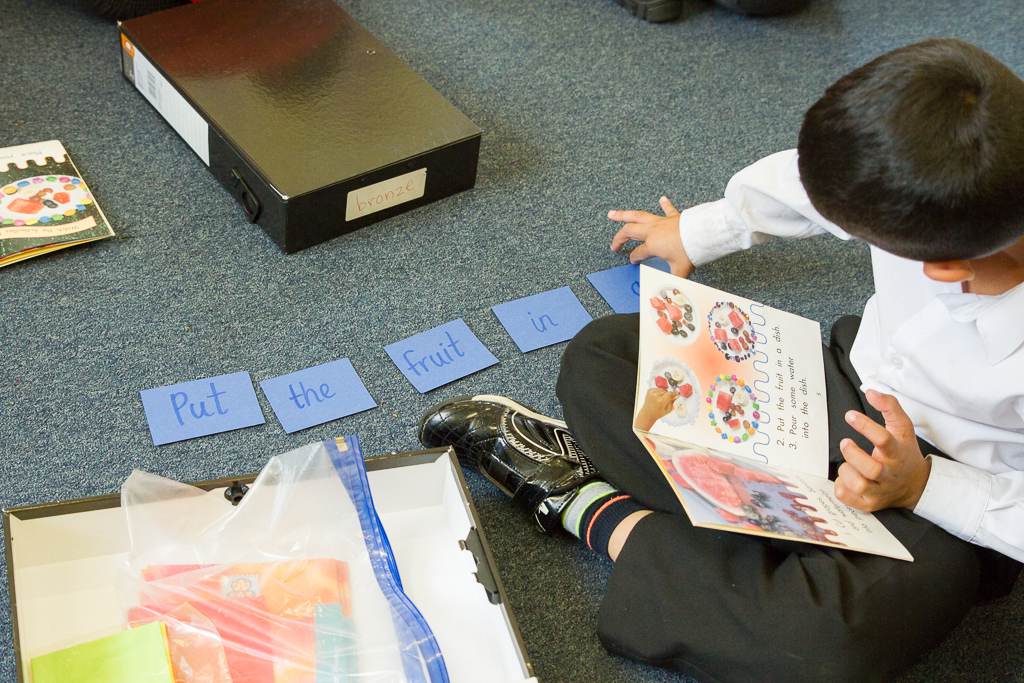
Reading
One of our main aims is to foster the enjoyment of reading for pleasure at Woodside. Interactive and stimulating book corners can be found in every classroom and pupils are offered a diverse and rich range of reading materials. Guided reading is taught every day across the school. In KS1, various reading schemes are banded into the colour book band system and multiple copies of the same text are used during guided reading. Whenever possible, children are given texts that are related to their topic. For example, year 3 could read information about the rainforest which will support their writing and topic work.
Teachers promote the enjoyment of reading by reading to their class on a daily basis. Children will also be given the opportunity to visit the local library to promote a love of reading throughout the year. The celebration of World Book Day creates a focus for promoting reading across the whole school.
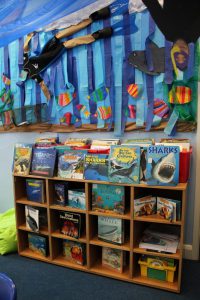
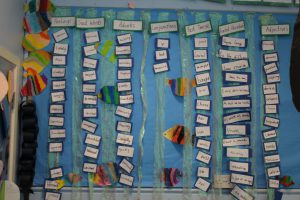
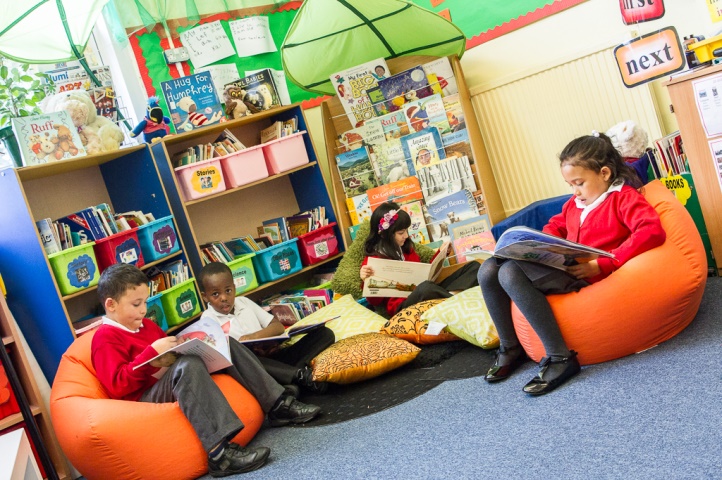
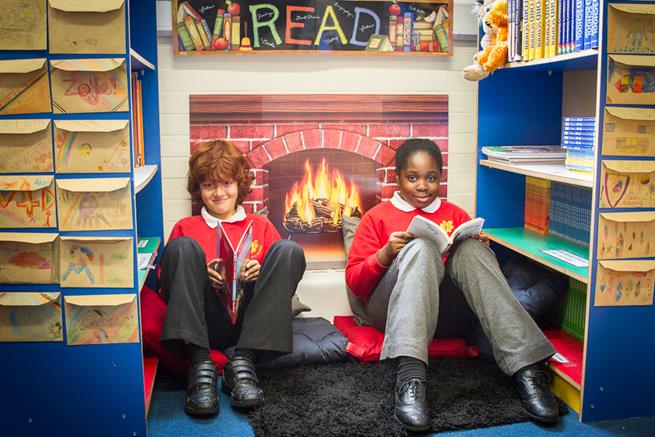
Phonics
We aim to ensure that all children have proficient word reading skills by the end of Key Stage 1. We have a systematic approach to teaching phonics. We follow the Read Write Inc approach which starts in Nursery and continues throughout Key Stage 1. Children are grouped according to their ability and are streamed across the year groups and each group follows the group appropriately matched to their level of ability. Children are regularly assessed to ensure they are making the expected progress.
The expectation is that children have mastered phonics by the end of year 2. However, if necessary Phonics is taught in KS2.
Phonics Screening Check
At the end of Year 1, children will undertake a statutory phonics screening check. This is a short assessment to make sure that children have learnt phonics to an appropriate standard. There are 40 words in the screening check which children are asked to read on a one-to-one basis with their teacher. The check is made up of 'real words' (eg. 'mud') and 'non-words' (eg. 'splog') and children need to apply their phonic knowledge to read all words. Year 1 children who do not pass the Phonics Screening Check will have to retake it in year 2.
Preparation for the check takes place during the daily phonics session but you can help your child at home by practising phonics on a regular basis. There are lots of books, games and apps that support Phonics. Below are some websites that you could use.
Oxford Owl Reading. click here
Articulation of Phonemes. Click here
English Working Wall
The classroom walls are a great way to support learning. When a teacher has showed the children how to write, the example will go onto the wall so children can refer to it throughout the lesson. Working walls are kept updated regularly and reflect current learning. The children are trained to refer to them to support their learning.
Writing
We provide a wide range of opportunities for children to write for different audiences and purposes. The curriculum is taught through termly topics and writing is linked to these topics, ensuring it is has a meaningful context.
In line with the Leader in Me programme, children are taught to be responsible for reflecting on their writing. Self-evaluation and partner conferencing is used to improve their writing. Children use green pen for these corrections.
Some writing will be published and displayed around the school for everyone to share and celebrate.
Published writing
Marking Writing
Teachers mark children’s writing using the codes below. They highlight three positive aspects with a yellow highlighter and select one improvement which is highlighted in pink and incorrect spellings highlighted in green. For longer pieces of writing, Steps to Success are stuck into the books and children self assess as they write.
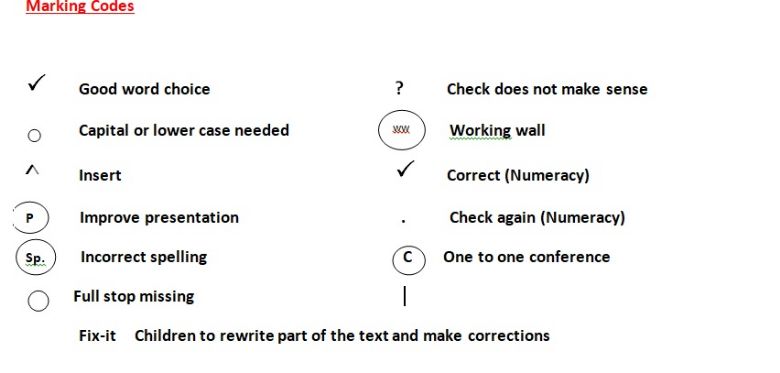
Teachers will check for the following before they comment on other skills. The key skills must be mastered by all children.
- Capital letters start a sentence and are used for proper nouns
- Full stops end a sentence
- Sentences must make sense
- The tense must be accurate
Statutory guidance
National curriculum in England: English programmes of study. Please click here
Literacy though ICT
Walthamstow Library’s website. Please click here
A fantastic website with lots of free resources for supporting reading at home. Please click here
Another great place to go for recommendations of books and lots more. Please click here
Another fantastic website with recommended books for each year group. Please click here
Another place to find reading lists, advice for reluctant readers and much more. Please click here
A bookshop that specialises ‘in books in which all children can see themselves and which reflect our world community in all of its diversity’ Please click here
Crickweb. free online education resources & games. Please click here
http://www.bbc.co.uk/bitesize/ks2/english/
Click here
/34D5F1E938AB0BCA5A3DDDFE6A4BF99F.jpg)
